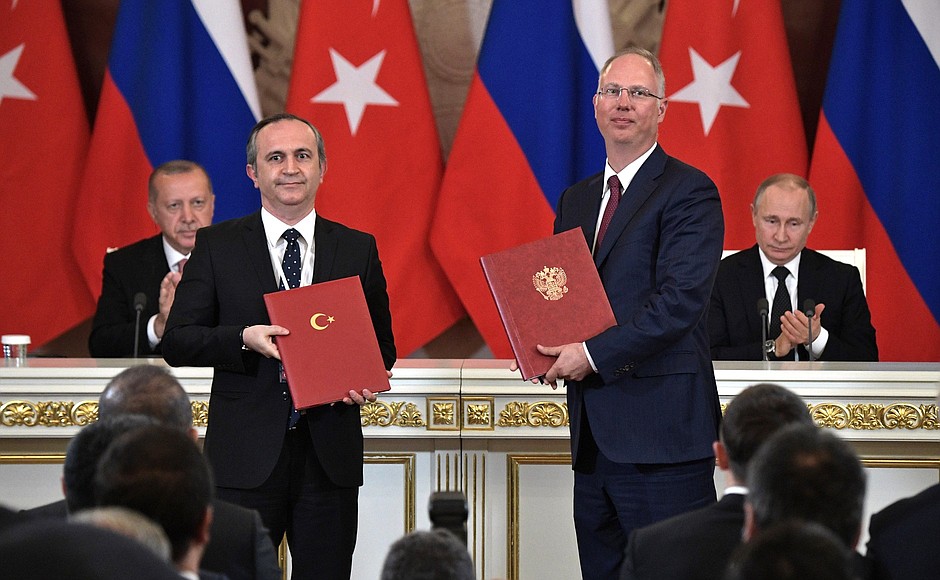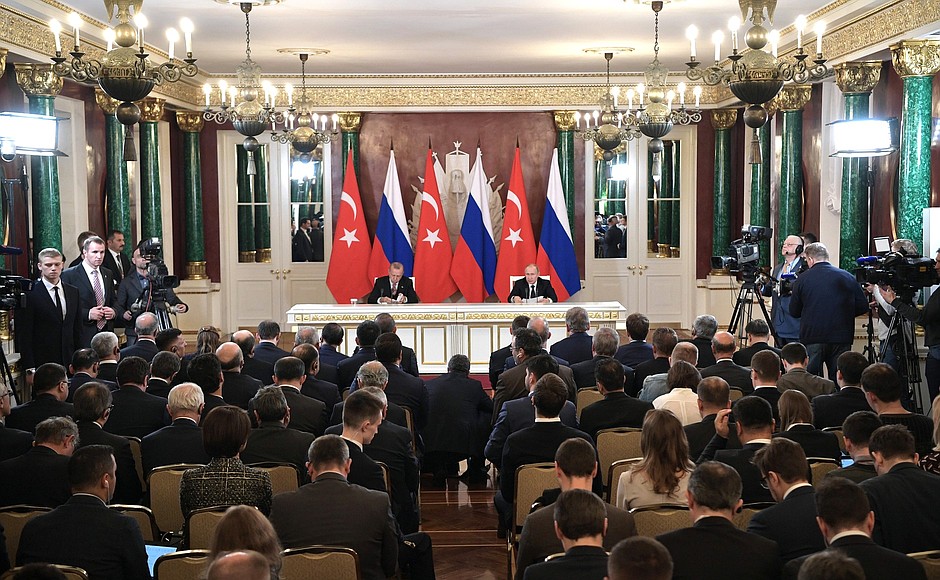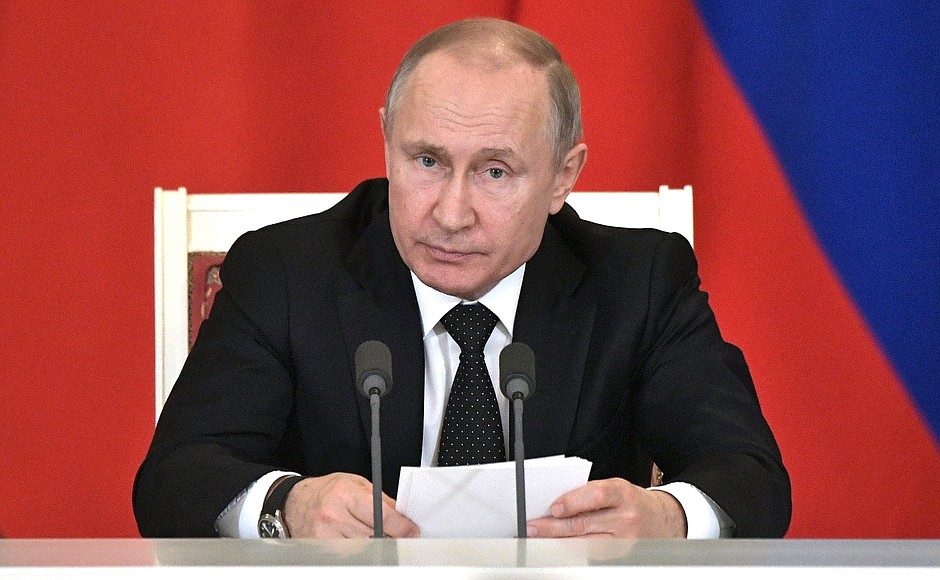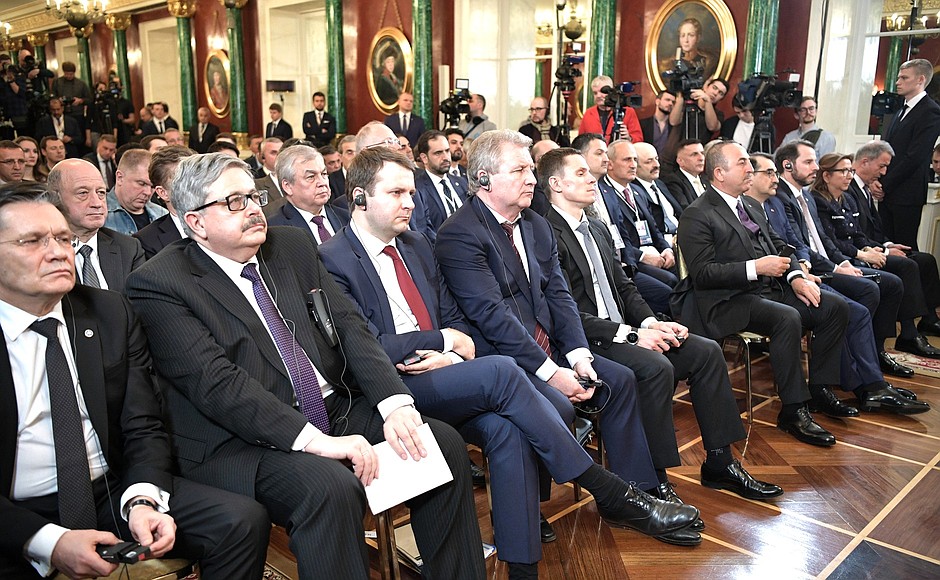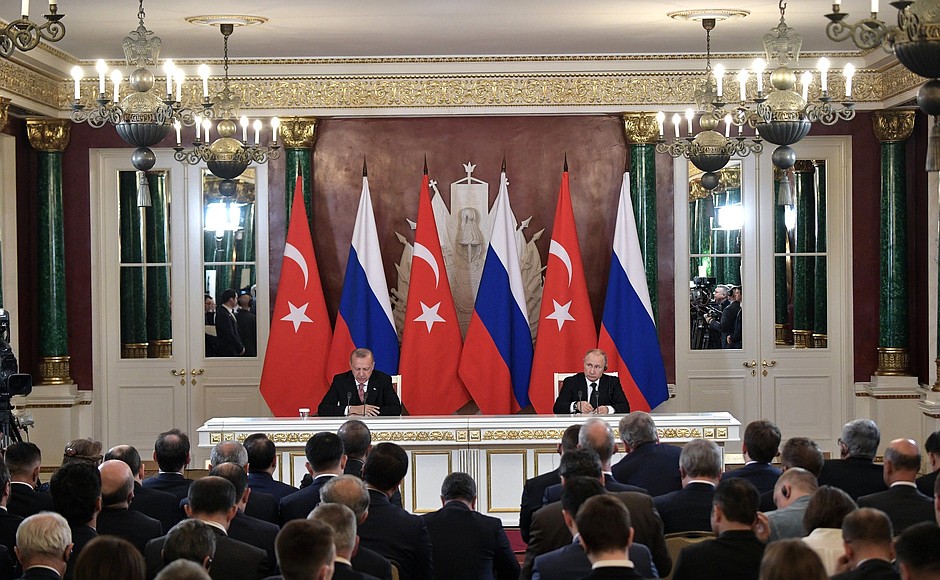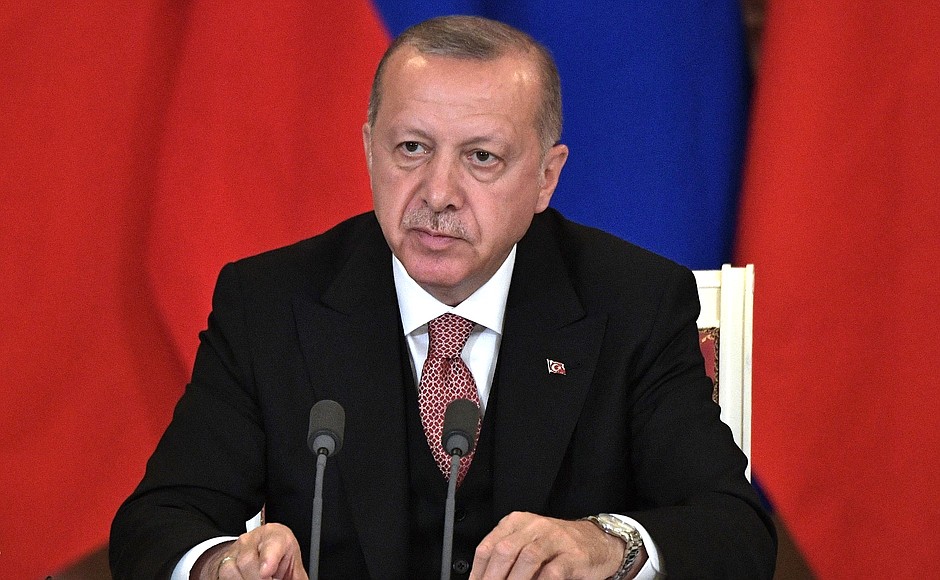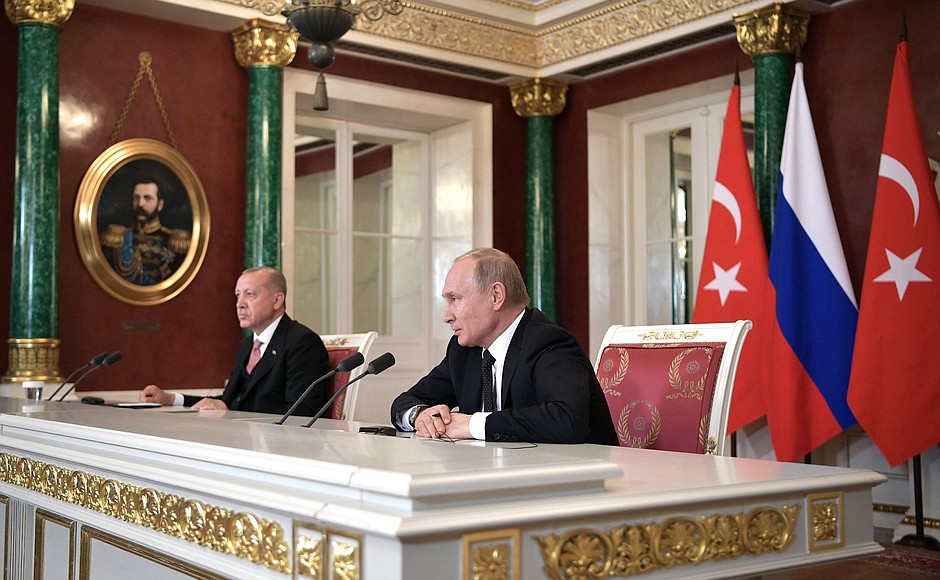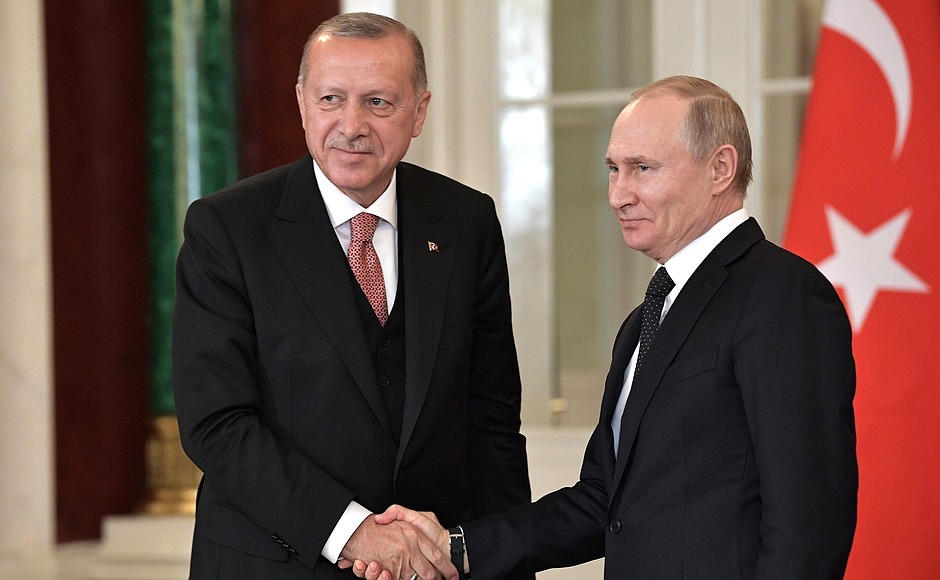President of Russia Vladimir Putin: Mr President, my friend, ladies and gentlemen,
It has been our pleasure to welcome the President of the Republic of Turkey in Moscow. We maintain close regular contacts, and today we held another High-Level Cooperation Council meeting. During the meeting, we had limited attendance talks with the participation of the heads of the main ministries, departments and major companies of the two countries.
Mr Erdogan and I also met with representatives of the Russian and Turkish business communities.
During the talks, Mr Erdogan and I discussed in detail the full range of bilateral cooperation issues. Naturally, we paid special attention to trade and investment ties that have recently become much more dynamic and extensive.
In 2018, trade increased by 16 percent to reach almost $26 billion. Mutual investment was substantial, reaching $20 billion.
The Mixed Intergovernmental Commission is playing a big role in organising our economic cooperation. The Russian-Turkish Business Council is working actively. It helps develop direct contacts between entrepreneurs of the two countries, including those representing small and medium-size businesses.
See also
The Russian Direct Investment Fund and the Turkey Wealth Fund facilitate the implementation of new joint projects. They have just signed an agreement on creating a $1 billion investment platform. I believe with such investment capital they will be able to raise at least $5 billion for various projects.
Our energy cooperation is strategic in nature. Rosatom is building Turkey’s first nuclear plant, Akkuyu – four energy units with a total capacity of 4,800 megawatts. The first unit is to be put into service in 2023 – the centenary of the Republic of Turkey.
The construction of TurkStream is proceeding as scheduled. The offshore section was docked with the onshore section on the coast of Turkey, and Russian gas deliveries to Turkish consumers along this route will begin before the year is out.
In the future, after TurkStream’s capacity is expanded and the second branch is built, gas will be transity to Europe as well.
Importantly, both these projects – the Akkuyu nuclear plant and TurkStream – meet the highest environmental and technical standards and will be essential to ensuring regional and European energy security.
There are good opportunities for deepening cooperation in the metallurgical industry, the automotive industry, agriculture, as well as innovation-driven and high-tech sectors. We discussed this in detail today with business representatives, as I have already mentioned, and learned about their initiatives.
We discussed Russian-Turkish cooperation in the defence sector, in particular, the contract for supplying S-400 Triumph anti-aircraft missile systems to Turkey. We discussed other current and promising defence cooperation projects as well.
Of course, we touched upon our cultural and civil society ties. The Russian-Turkish Public Forum does a good job in this area. Rectors of Russian and Turkish universities met in Ankara in February. Turkish journalists came to Moscow as part of an exchange programme between news agencies. Russian reporters, in turn, will go to Turkey this summer.
A high level of tourist exchanges is typical of Russian-Turkish relations. Turkey is becoming increasingly popular with Russian tourists, who visit not only Turkish resorts, but numerous historical and cultural landmarks as well. Last year, Russia, with six million tourists, again ranked first in the number foreign tourists visiting the Republic of Turkey.
In turn, we appreciate the Turkish authorities’ focus on the safety and convenience of Russian tourists, and we will consistently work on easing mutual visa regulations.
In part, the issue of exempting professional drivers from entry visas will be resolved in the near future.
Ties in science, education, the arts and tourism have always helped strengthen the atmosphere of trust and understanding between our countries. I would like to note in this context that President Erdogan and I attach great importance to the Cross Year of Culture and Tourism of Russia and Turkey, which will open today with a performance of the Turkish opera “Troya” at the Bolshoi Theatre in Moscow.
Discussing major international issues, we certainly devoted much attention to developments in Syria. Let me emphasise that Russia and Turkey will continue their effective cooperation in the framework of the trilateral Astana format with Iran’s participation.
Now that the main terrorist forces have been routed, it is important to concentrate on the final stabilisation of the situation and on promoting the political settlement process in line with UN Security Council Resolution 2254. In this context, Mr Erdogan and I agreed to do everything we can, in coordination with the Syrian Government, the opposition and the UN, to facilitate the launch of the Constitutional Committee.
We also discussed the situation in the Idlib de-escalation zone and prospects for the comprehensive implementation of the Sochi memorandum. I hope our joint efforts will help achieve normalisation in and around the de-escalation zone and eventually neutralise this terrorist hotbed. Importantly, we are guided by the necessity of preserving the sovereignty, independence and territorial integrity of Syria. The division of the country into zones of influence is unacceptable.
Humanitarian assistance for Syria’s post-conflict recovery is a primary goal. I am referring to the construction and repair of essential infrastructure, housing, hospitals, schools as well as water and electricity supply facilities. It is important that the entire international community should take part in these efforts. Only together can we create the necessary conditions for the return of Syrian refugees and temporarily displaced persons to their homes.
In conclusion, I would like to say that the current meeting of the Cooperation Council and our bilateral talks were highly successful. I am convinced that today’s agreements will help further develop Russian-Turkish cooperation in all areas.
I would like to thank our friend Mr Erdogan and all our Turkish colleagues for working with us.
Thank you very much.
Question (retranslated): Mr President, Mr Putin,
A meeting was held today with an emphasis mostly on the economy. As we know, trade relations are developing in favour of Russia, when we speak about $26 billion. You said that the objective was to reach the $100 billion mark.
What can be done? What kind of roadmap? Will the roadmap take into account payments in national currencies?
On February 6, Mr Putin issued an executive order that liberalised visas. Will all citizens of Turkey enjoy this or not?
Vladimir Putin: If we speak about the trade balance, it may indeed be in favour of Russia. But this does not mean that all the trade relations are working out in Russia’s favour. This is absolutely not true.
We certainly should work for well-balanced trade relations. Today, too, if you think that all our talks were so rosy, that we were just singing praise to each other and talking about achievements alone… No, this is not so.
But since you asked such a pointed question, I will answer it in more detail. It was a business meeting today, a specific, business-like, working meeting.
For example, we were disputing the fees imposed on our iron and steel industry. For us, our Turkish partners have raised the rate by 2–2.5 percent, while reducing it by 1.3 percent for some other countries. We understand what it is all about; we know the gist of the matter. I am just saying, for your sake, that all is not so rosy. Of course, our Turkish partners are fighting for their interests, and we – for ours.
As for the energy carriers mentioned by Mr Erdogan, they are formed by the market, not by Gazprom. Such are the market prices; they are not imposed by a Gazprom directive.
There are questions and there are problems in this regard as well. Our Turkish friends are insisting on certain aspects, while Gazprom, out of commercial considerations, is suggesting different solutions. But these solutions will be found anyway. We will be looking for them and we will find them, because we set great store by the Turkish market and relations with our Turkish partners and friends.
However, I want to tell you about the most important aspect. It does not just have to do with the price, although it is a very important parameter; it has to do with the stability of Russian gas deliveries. Turkey has signed many gas delivery contracts, and far from everyone fulfils their contractual obligations. However, Russia unfailingly meets its obligations in terms of the volumes and prices, and acts in line with its long-term contracts, disregarding the ongoing price indicators. This creates fundamental conditions for Turkey’s economic development because the business community understands its long-term prospects and is confident of the deliveries.
Moreover, Russia delivers additional energy carriers to the Turkish market in autumn and winter at the request of the Turkish government because Turkey’s other partners are unable to meet their obligations, and we do this on a regular basis. At the same time, we realise that trade should be more balanced, and we have a certain potential in this area. We discussed this matter today.
Work also continues on the construction industry market. In the past few years, Turkish companies have implemented projects worth $70 billion in Russia. Just think about these statistics. Many facilities were built during preparations for the Sochi Olympics and the 2018 FIFA World Cup, and these construction projects continue. Today, we have discussed road construction and other projects with Turkish business representatives.
There are excellent prospects in the metallurgical industry and chemistry, the fertiliser sector and road transport, including both haulage and vehicle production. I am not even talking about military-technical cooperation. This involves high-tech production. We can launch joint research and development projects and jointly manufacture high-tech military equipment.
Therefore, it would be inappropriate to use stereotypes here and say whether this benefits Russia or not. This benefits the people of Turkey and the people of Russia, and we will work on a well-balanced approach.
There was also a question about abolishing visas. As I said, we have reached an agreement, and we will now make a decision on drivers of large-capacity lorries. We have practically agreed that all holders of Turkish business passports will be covered by a visa-free regime. According to Turkish regulations, Turkey has three times more people in this category than Russia.
Regarding the visa-free regime in general, this issue is linked with overall regional security, including the final resolution of the Syrian problem. Our security services should jointly draft certain parameters of their work. This work is underway.
Question: I have a question for both leaders. In recent months, you have met very often by diplomatic standards and we have heard that you discussed the Idlib situation at each meeting. Judging by what you said earlier, you discussed Idlib today again.
Does this mean that you have not managed to fulfil the Sochi agreements on Idlib? If so, what is the problem? Is this one of the problems that can prevent political settlement in Syria on a par with the US recognition of Israel’s sovereignty over the Golan Heights?
Vladimir Putin: As for the Golan Heights recognition as part of Israel, you should be aware of Russia’s position: it was set forth in the relevant statement by the Foreign Ministry. That decision runs counter to the relevant UN Security Council resolutions.
The Idlib problem is acute. Indeed, we have been unable to reach the parameters that we agreed upon in Sochi so far but I believe that this problem can be resolved. Our defence ministers met and discussed this problem just recently.
Essentially, we are to start joint patrolling, or patrolling on both sides, at any rate. We have not yet established a monitoring centre but I am sure we will do so.
Yes, progress in this area has not been not as fast as we would like, but still progress is in place. I have already said in my remarks that all terrorist centres must be eradicated, destroyed, and we will press for it.
We will have to resolve the Idlib zone problem in order to create conditions for a peace process. We can only do it jointly and we will move forward along this line.
<…>
Question (retranslated): During today’s talks, you stressed that the two states’ cooperation on the Syrian issue was very important. What steps do you plan to take during the political transition period?
Vladimir Putin: A full-fledged Syrian political process can begin only after the establishment of the Constitutional Committee. Its line-up is being coordinated with the UN, the UN Secretary General’s Special Representative, to be more exact. Both Russia and Turkey are now working actively on this.
Question: I have a question for both presidents, if I may. In the past few years, we have witnessed a rapid development of Russian-Turkish relations. Do you believe the current foundation and good prospects for future development are enough to counter the attempts of third countries to influence Russian-Turkish cooperation agreements, including such projects as TurkStream and S-400 deliveries?
Vladimir Putin: We are working on this. Relations between our countries are developing very actively, fruitfully and with good results. By the way, this concerns all aspects. We can see progress in the economic sphere and in regional security; we continue to work jointly and to post good results despite all the difficulties.
We are working on major energy projects and expanding relations in other areas, including agriculture. Turkey has recently increased its agricultural produce deliveries to the Russian market several times over. There are many other aspects as well.
Is it possible to say that we have done our best to guarantee our economic sovereignty? No, we have not accomplished enough so far. That is why the President of Turkey insisted today that we use national currencies in our payments and settlements more actively.
There are other matters of mutual interest. It goes without saying that the implementation of all these plans will benefit the development of our economic ties. I am confident that this will have a positive impact on the social sector in our countries.
